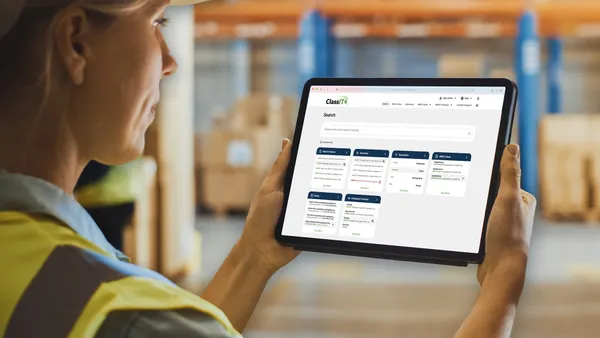Dive Brief:
- In a joint report discussing artificial intelligence (AI), DHL and IBM outline practical use cases for AI in the logistics industry.
- The report claims AI continues to become more readily accessible and affordable and that "in logistics, the network-based nature of the industry provides a natural framework for implementing and scaling AI."
- AI can provide insight for 3PLs, shippers and carriers based on AI analysis of supply chain data, according to the report. It can also help employees find the right information they need faster, help employees log information more efficiently and streamline customer support.
Dive Insight:
AI has been a buzzword in the supply chain world for a while, but the joint report from IBM and DHL provides the kind of detail supply chain managers and logistics professionals are looking for. The report makes a convincing case for AI in logistics, and as more AI startups pop up to cater to the logistics industry, there's no sign of AI's popularity waning.
1. Harnessing data
The most clear use case for AI in supply chains is harnessing all the data from the supply chain, analyzing it, identifying patterns and providing insight to every link of the supply chain.
According to the report, "One of the most underutilized assets in the industry is the high volume of data that supply chains generate on a daily basis. This data is both structured and unstructured, and AI will enable logistics companies to exploit it."
2. Customs brokerage
AI can automate and accelerate the brokerage process while improving the margin of error and generating more cost savings.
"The major issue with customs declarations today is that they rely on highly complex manual processes that require skillful knowledge of regulations, industries, and customers," the report stated. "It is also an effort-intensive process; information must be cross-referenced and validated from customer and carrier documents, regulatory bodies, and government-specific forms. All of this necessitates close attention to detail yet, of course, it is difficult for human workers to maintain consistent levels of concentration throughout the workday. This can result in costly mistakes; companies may incur non-compliance fees and demurrage charges for goods held in customs too long."
3. Predictive analytics
What will be most revolutionary for the logistics industry is AI-generated predictive analytics, including predicting demand, optimizing routes and handling what the report calls "network management."
"DHL has developed a machine learning-based tool to predict air freight transit time delays in order to enable proactive mitigation," according to the report. "By analyzing 58 different parameters of internal data, the machine learning model is able to predict if the average daily transit time for a given lane is expected to rise or fall up to a week in advance."
While it's easy to dismiss AI and obsessively track it's status on the Gartner Hype Cycle (where AI is currently at the "peak of inflated expectations"), the technology has real implications for the industry, and if harnessed appropriately, will propel forward-thinking companies ahead of the competition.













